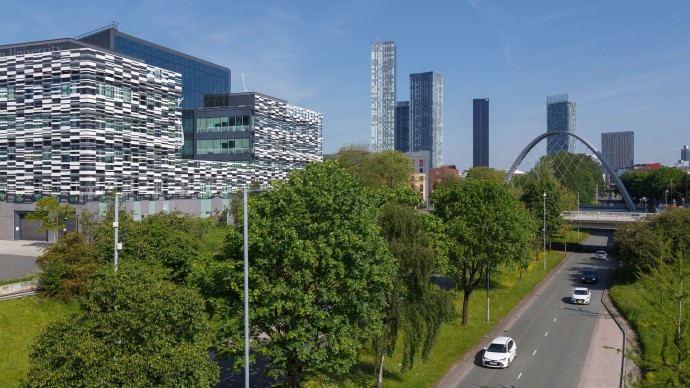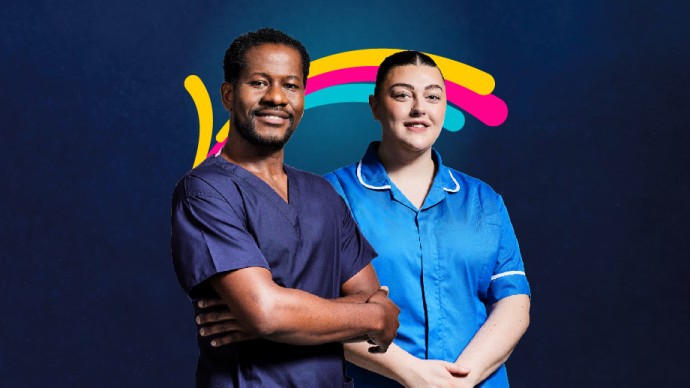Providing the NHS talent pipeline
Hero story providing a talent pipeline

About
As the University reaches its 200th anniversary, this piece reflects on its role in providing a talent pipeline to the NHS. Manchester Met delivers a constant supply of highly trained nurses to support the delivery of modern healthcare.
Since it was established in 1948, the NHS has become a cherished institution. With a workforce of approximately 1.45 million employees, patients know they will be seen by qualified professionals with the skills to deal with all conditions. From minor ailments to major trauma, the clinicians see it all.
The main story - intro
NHS pressures
The NHS is under more pressure than ever. Trusts across the country are dealing with huge financial deficits, long waiting lists, high demand, and workforce shortages.
In fact, workforce shortages are currently one of the biggest challenges facing the NHS and adult social care. The opinion of NHS staff on workforce issues has worsened and the public also believes that a lack of staff is one of the main problems that the NHS is facing.
In the first quarter of 23/24 the NHS had 126,000 vacancies with 43,000 in nursing. While the number of nurses has increased to 373,389, it doesn’t meet the increased demand for services. Demand that will continue and rise due to people living longer.
The NHS must ensure it has an ongoing supply of qualified healthcare professionals to meet this demand.
Manchester Metropolitan University is a major provider of graduates to the NHS. It provides a talent pipeline, supporting the resilience of the NHS workforce across Greater Manchester.
Each year around 400 registered nurses graduate in adult nursing and mental health nursing having completed graduate and postgraduate pre-registration programs. Nursing associates also graduate, whose roles are to support registered nurses. Many go on to work in hospitals and community services across Greater Manchester.
The main story - with videos
From being nursed to nursing
After fighting for her life in hospital as a patient, Ivie Attoh realised she wanted to be a nurse. Fully recovered, she found a course at another university. But the passion and commitment she discovered at an open day convinced her to study at Manchester Met.
“This is where I want to be”
Ria joined Manchester Met after working in a call centre with no experience in healthcare. Now a mental health nurse, she discusses how her training and support from personal tutors have helped give her a future that looks bright.
An exciting future for Joseph
Originally from Warrington, Joseph joined Manchester Met to study the adult top-up nursing course in a city he calls home. Now a registered staff nurse, he speaks of his journey and how the sky is the limit.
“I see myself being a nurse in 20 years”
When he came to the UK from the Congo, Spack Lobota had no healthcare experience. Now a registered nurse, he reflects on his training and the tutor who convinced him to carry on when he doubted he could complete his course.
The main story continued
Changing lives
Professor Mark Hayter, Head of the School of Nursing and Public Health at Manchester Metropolitan University said: “The University makes a substantial contribution to the NHS workforce locally and we are very proud of that.
“All our graduates will touch people’s lives. There aren’t many jobs in which you will have a significant impact or change someone’s life every day.”
He went on to add: “We have extremely strong links with our NHS and other health and social care partners in the North West and they are incredibly important to us. We work very closely with them. We provide a pipeline for their workforce for new registrants, and we also train their existing workforce in advanced clinical skills.”
All our graduates will touch people's lives. There aren't many jobs in which you will have a significant impact or change someone's life every day.
For example, postgraduate nursing programmes focus on advancing practice. The Advanced Clinical Practice Masters degree apprenticeship equips experienced nurses to work alongside other members of the multi-disciplinary team providing expert care to patients across acute and community services. They are trained to a very high clinical level and also have expertise in research, education and leadership.
There are also postgraduate courses that educate nurses to independently prescribe medication. This provides nurses with the advanced skills and knowledge to improve patient choice and access to medicines, whilst supporting the modernisation of the NHS.
Maintaining the clinical workforce
The University makes a significant contribution to the NHS workforce, which needs to maintain numbers of staff to provide high-quality care. It has many partners across the NHS, and they offer placements for students.
We offer high-quality placements, and we are very proud of that. We work very hard to make sure that students get a good experience.
Mark added: “We wouldn’t be able to train nurses, physiotherapists, and dietitians without that partnership. Clinical experience is vital and nurses spend 50% of their program in clinical practice.
“Students experience a varied number of placements across their programme, and this experience gives them a good sense of where they want to work. Quite often they will go on to work at the hospital where they did their last few placements and hospitals are keen to snap up good students.
“We offer high-quality placements, and we are very proud of that. We work very hard to make sure that students get a good experience.”
The University also provides education to support the specialist community public health workforce. This is done via degree apprenticeships to enable qualified nurses to become either health visitors, district nurses or school nurses. This adds around 40 or 50 specialist nurses to the community workforce every year.
High quality training
The quantity of nurses that the University provides is significant. More important is the quality of the training.
Lindsay Gregory is the Lead Practice Education Facilitator at Stepping Hill Hospital in Stockport. She said: “It is crucial that we have a constant supply of student nurses. Staffing populations are changing, and we have fewer nurses on shift. We need people who understand what care needs to be delivered, to shape that care and run the wards.
“Working closely with the University assures me that we have the same ethos of preparing excellent nurses for practice as opposed to just getting degrees through. Nursing is a hands-on job and there are skills that you are required to learn that you can’t always take from a book.”
Student nurses benefit from innovative simulation facilities so that they can apply their clinical skills and knowledge in a safe setting. Virtual environments are set up and actors are used to ensure that future nurses have the communication skills to deal with challenging situations once they are practicing.
We aim to develop students to make them knowledgeable, skilled, empathic practitioners, who are also flexible and adaptable.
Professor Hayter explained: “It’s difficult to make the transition from a student to a registered nurse, but they are equipped with the skills and confidence to make that transition.
“You can teach someone to become qualified, but it is about also giving them the confidence to deal with the unexpected and the things that they haven’t covered in their training. We aim to develop students to make them knowledgeable, skilled, empathic practitioners, who are also flexible and adaptable.”
This is achieved by ensuring that there is a cohort of lecturers who have clinical experience. All lecturers who teach nurses are nurses themselves who bring clinical skills from the NHS.
Additionally, part-time associate lecturers work in both clinical practice and in the classroom. This is highly valued by students because it gives them contemporary clinical experience, and the opportunity to learn about the most up-to-date techniques.
The ways in which the University supports the NHS are far-reaching. Manchester Met also provides graduates in physiotherapy, dietetics, speech and language and social work.
Some students opt for the degree apprenticeship route. This is pivotal in supporting the professional development of frontline workers, and health and social care managers across disciplines. They all have an impact on the health outcomes of people living in Greater Manchester and on people’s lives.
Lindsay added: “It’s a real privilege to be with people when they’re unwell and very vulnerable. You are able to support people and their families and make a difference. I don’t think there are many jobs that you could do that every single day.”
Listen to our podcast
Our building

Explore our building
The award-winning Brooks building is located on the Birley campus. It is home to the Faculty of Health and Education, the Movement Unit, and Birley Kitchen.About 200 years
Manchester Met celebrates two centuries of driving progress through excellent education and research.
-
![200 years 1824-2024]()
200 years
Find out more -
![Two nurses standing together and smiling]()
Transforming health
Find out more


